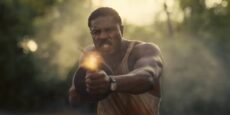
People tell me all the time how much my two boys looks like. They are both blonde with blue eyes, but other than that, they couldn’t look more different—to me. Asher, my oldest, has my jawline and smile, but his father’s eyes and brow. Pace, my youngest, has my eyes and nose, his dad’s chin and a dimple in his right cheek I would kill for. Plus, once you get to know them, and learn how different their personalities are, it’s hard to remember they came from the same parents.
About a year ago, my husband and I decided to land on a “mantra,” something we would repeat to the boys every morning as they head out the door into the big world awaiting them.
“Be brave! Be wise! Be kind!” This is what we landed on. And in a way we never anticipated, these three phrases remind us of how different my boys really are.
Brave for one looks far different than brave for the other. Which shouldn’t be that surprising. At some point, all parents learn there is no formula for raising our kids. We learn the ropes with our first—and relearn them with every subsequent child to follow. They are their own deal.
When I hear the word brave, I think about the opposite of fear—about facing my anxieties, and going for the thing fear is holding me back from. I think of action and movement. And for one of my boys, this is exactly the kind of brave I envision for him. He is more cautious, thoughtful, and can hold back, to the extent of costing himself a good time. When I tell him to “be brave,” I want him to hear me say, “You are more capable than you believe you are, and if you would know it, and act on it, you would leave what is safe, but also what is confining you, and encounter a far bigger and better world than you imagine existed.”
But I have another son, and he was the one who made me hesitant to pick “brave” as part of our mantra. He doesn’t need to be pushed towards “movement” or fearlessness. He could use a little more fear. A little more caution. A little more hesitancy when it comes to attempting things like the long jump from the living room couch, or trying to take flight from the highest height the swing on our backyard swing set goes to. “Be careful” seems like a more appropriate mantra fro him—in addition to being smart and being still.
But I may have been reading brave all wrong.
In Joshua chapter 1, God tells Joshua, “be strong and courageous.” It’s good advice. The leader of the Hebrew people for the past forty years, Moses, who led them from slavery in Egypt, into the desert and all the way to the edge of the Promised Land, has died, and Joshua is the new leader. No pressure. I’m sure he didn’t suffer from feelings of inadequacy at all.
And so God tells Joshua, less of a command I imagine, and more an assuring and encouraging whisper in the young leader’s ear, “Be strong and courageous.”
But what Joshua would learn, is that strong and courageous doesn’t always mean movement, fearlessness, or brazen action. In fact, courage here means established. It means not moving—when the temptation is to do otherwise. Sometimes strong and courageous means steadfastness in spite of the action around you. It means standing your ground.
And for both of my boys, that’s a definition of brave I can get on board with.
When it comes to our kids, it’s important we get the idea of “brave” right. When we speak of bravery, we need to speak of courage for some to step out and discover more of themselves. And for others to know when to step back and stand their ground.
When we speak of courage, we need to speak of the need to look fear in the face and charge forward, in spite of our fear. And we need to speak of the need to look fear in the face and not move an inch in conviction.
When we speak of bravery, we need to both encourage them to timidly speak, “Yes.”
And we need to prompt them to determinedly say, “No.”
Parenting is a lesson in learning the nuances of our kids, and the nuances of our hopes for them. What we whisper in the ear of one at night might sound different from what we whisper in the ear of another. And though they sound contradictory, we know what we want for all of them is actually very much the same. Brave has different shades. My prayer is for my boys to be wise enough to know the situations that call for the varying kinds of brave available—however it looks.
“Be brave,” I will tell them. Every morning, every night, every chance I get. “Be brave in your action and be brave in your inaction. Be brave in your confidence and be brave in your uncertainty. Be brave as only you are able to be. And I, as a result, will be proud.”
Reflect on each of your kids and describe how they are different. Find a way to encourage each one in a specific way to be brave.
Source: The Parent Cue






